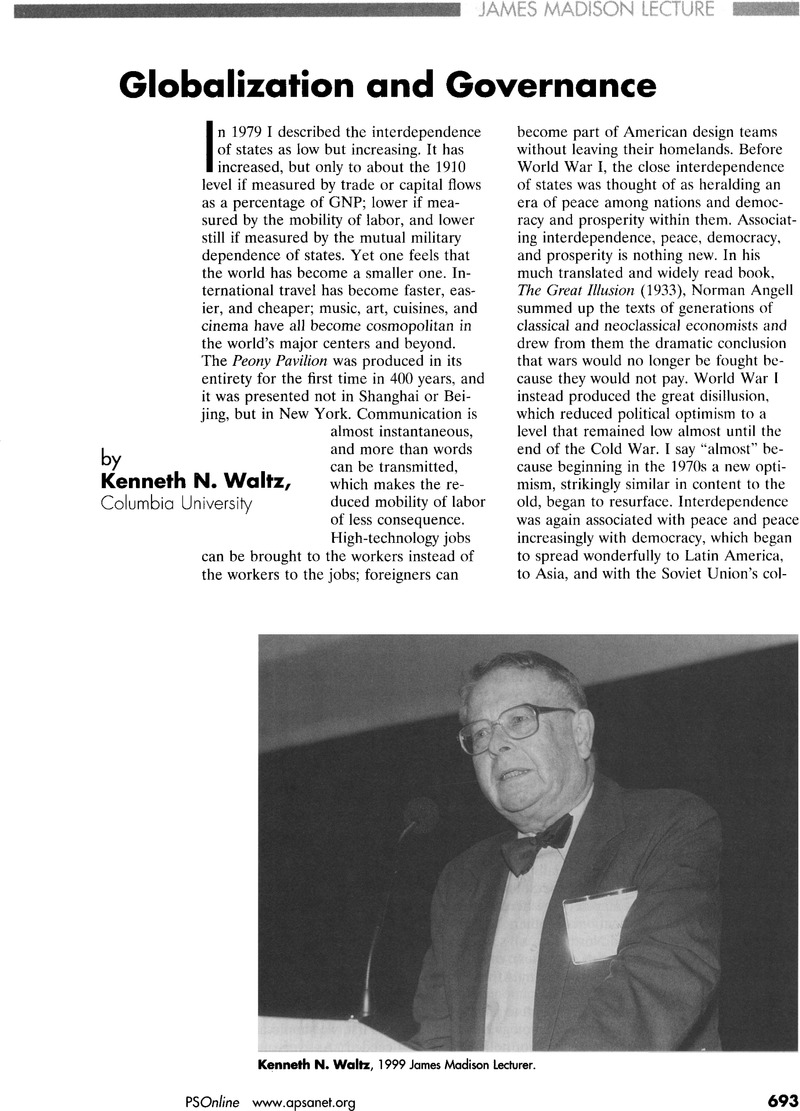Crossref Citations
This article has been cited by the following publications. This list is generated based on data provided by Crossref.
Albert, Mathias
2000.
From defending borders towards managing geographical risks? Security in a globalised world.
Geopolitics,
Vol. 5,
Issue. 1,
p.
57.
Pufong, Marc G.
2001.
State Obligation, Sovereignty, and Theories of International Law.
Politics & Policy,
Vol. 29,
Issue. 3,
p.
478.
Winter, Bronwyn
2002.
Women's rights, globalisation and the nation-state: are human rights and democracy enough?.
Australian Feminist Law Journal,
Vol. 17,
Issue. 1,
p.
1.
Farazmand, Ali
2002.
Globalization, Privatization and the Future of Modern Governance: A Critical Assessment.
Public Finance and Management,
Vol. 2,
Issue. 1,
p.
151.
Cooper, Terry L.
and
Yoder, Diane E.
2002.
Public Management Ethics Standards in a Transnational World.
Public Integrity,
Vol. 4,
Issue. 4,
p.
333.
Nuesiri, Emmanuel
2004.
Economic Globalization and Institutions of Global Governance: A Response to Griffin.
Development and Change,
Vol. 35,
Issue. 3,
p.
601.
ISH-SHALOM, PIKI
2006.
The Triptych of Realism, Elitism, and Conservatism.
International Studies Review,
Vol. 8,
Issue. 3,
p.
441.
Tadic, Tadija
2006.
The globalization debate: The globalists.
Panoeconomicus,
Vol. 53,
Issue. 1,
p.
51.
Tadic, Tadija
2006.
The globalization debate: The skeptics.
Panoeconomicus,
Vol. 53,
Issue. 2,
p.
179.
Gooch, Geoffrey D
2007.
Governance as a Trialogue: Government-Society-Science in Transition.
p.
123.
Gartzke, Erik
2007.
The Capitalist Peace.
American Journal of Political Science,
Vol. 51,
Issue. 1,
p.
166.
YANG, Oh Suk
2007.
A Critical Review of the British State-Society Relation through Discourse Configuration for Policy-making.
Interdisciplinary Information Sciences,
Vol. 13,
Issue. 1,
p.
89.
Tang, Kuo-yang
2008.
From philosophy of history to political philosophy: an ideological investigation of globalization.
International Review of Sociology,
Vol. 18,
Issue. 2,
p.
197.
Jabbra, Joseph G.
2008.
Le contexte global de notre village mondialisé.
Revue Internationale des Sciences Administratives,
Vol. Vol. 74,
Issue. 1,
p.
159.
Fabbrini, Sergio
and
Sicurelli, Daniela
2009.
The Domestic Conditions for a Paradigmatic Change in US Foreign Policy.
The International Spectator,
Vol. 44,
Issue. 1,
p.
51.
Gartzke, Erik
and
Rohner, Dominic
2010.
To Conquer or Compel: War, Peace, and Economic Development.
SSRN Electronic Journal,
Midttun, Atle
Martinelli, Alberto
and
Midttun, Atle
2010.
Globalization and governance for sustainability.
Corporate Governance: The international journal of business in society,
Vol. 10,
Issue. 1,
p.
6.
Drezner, Daniel W.
2010.
Is historical institutionalism bunk?.
Review of International Political Economy,
Vol. 17,
Issue. 4,
p.
791.
Lee, Dong Sun
and
Kim, Sung Eun
2011.
Ties That Bind? Assessing the Impact of Economic Interdependence on East Asian Alliances*.
Pacific Focus,
Vol. 26,
Issue. 2,
p.
206.
Kearn, David W.
2011.
The hard truths about soft power.
Journal of Political Power,
Vol. 4,
Issue. 1,
p.
65.



